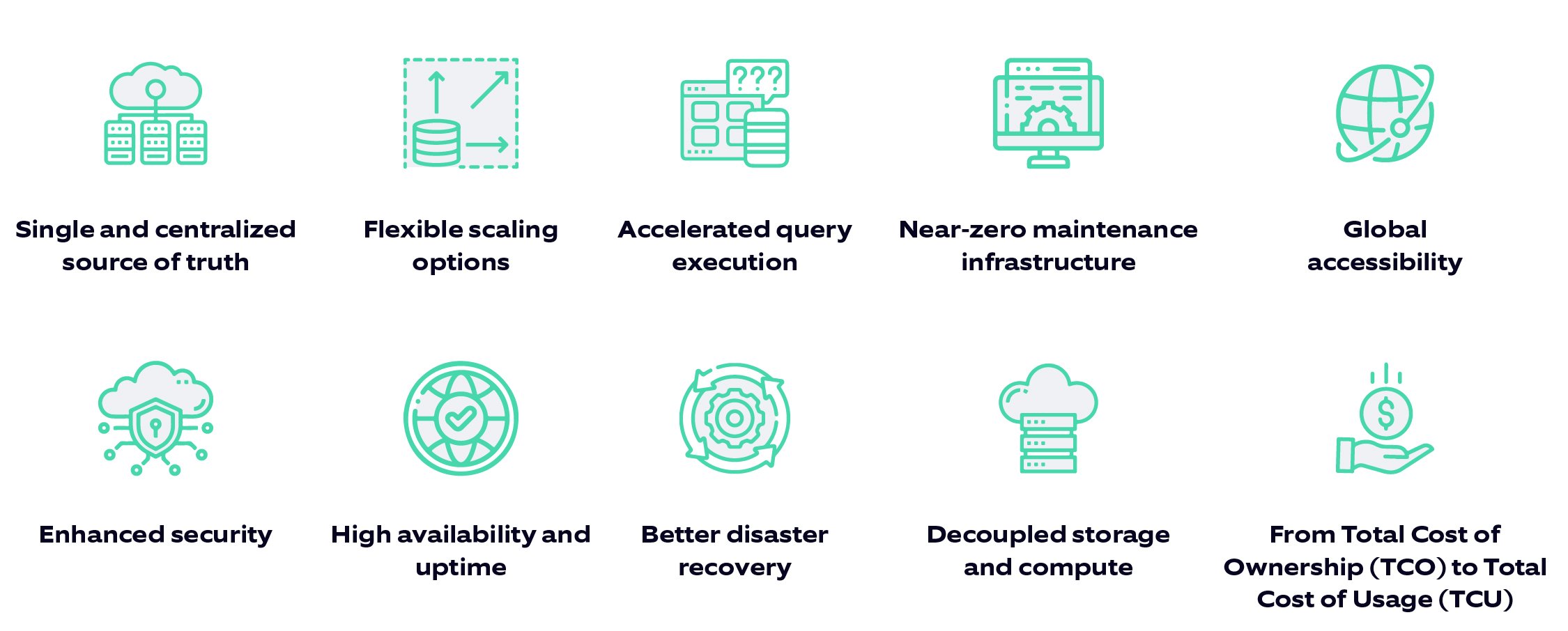Nowadays, retailers, consumer packaged goods (CPG) manufacturers, and e-commerce companies operate in a dynamic and highly competitive market. These companies continuously invest in new technologies to stay ahead of the curve. The objective is to digitalize and automate retail activities to increase productivity, reduce costs, and lead the race.
Retailers employ various software tools to help with transactions, e-commerce, inventory management, etc. These software tools generate lots of transactional and non-transactional data, such as weblogs, consumer comments, and web traffic counters. Other data sources such as social media, the Internet of Things, and data exchanges are also rising.
How can retailers organize all this data to find solutions to business challenges? Let us find out!
The challenge
Deploying more software applications smoothens the process and enriches the customer experience but retailers struggle to make optimal use of these datasets for decision-making.
Some retailers use their on-premise data warehouse to aid their decision-making process. An on-premise data warehouse requires continuous maintenance, pre-planning, and robust infrastructure. Retailers need advanced analytics, top-notch data security, real-time data processing, and sharing to take the lead. While working with an on-premises data warehouse, getting all these capabilities can be quite complex due to the ever-growing data volume, heterogeneous data sources and types, legacy systems with data silos, and streaming data sets.
The solution
Cloud data warehousing is one of the most successful solutions to these challenges. It integrates all data sources into a central repository and organizes data in such a way that it can efficiently solve business problems.
A recent IndustryARC report says that "After growing at a CAGR of 31.4% from 2021 to 2026, the cloud data warehouse market is expected to reach $39.1 billion by 2026. "
Snowflake, AWS Redshift, Azure Synapse Analytics, and Google BigQuery are some of the major cloud data warehousing services. These services are almost equally capable of handling most problems for the retail industry mentioned earlier, with slight differences in their features, offerings, and pricing.
Cloud data warehouse features and how they can help solve challenges of the retail industry

Single and centralized source of truth: The journey starts with storing the data from different data sources into one database (built over any of the cloud data warehouse services) that becomes the single version of the truth. Cloud data warehouse's capability to store structured and semi-structured data makes it a perfect choice for the retail industry. The data from various applications, legacy systems, social media, weblogs, IOTs, etc., can be easily captured into cloud data warehouse, making it a centralized data source for all analytical and reporting needs.
Flexible scaling options: Suppose a retail company runs several complex Business Intelligence (BI) reports, scheduled queries overnight, and regular queries over a day. The company would require a different compute capacity at night as compared to the day. Cloud data warehouse tackles this problem by setting up a small configuration, allowing easy scale-up or scale-down of the warehouse based on the workload. The flexible scaling can handle any amount of data, users, and workloads.
Accelerated query execution: Most of the cloud data warehouse stores data in a columnar format making accessing data quicker than other traditional data warehouse systems. Native SQL support in cloud data warehouse accelerates the analytics and reporting needs of the retail industry.
Suppose a retail organization decides to launch offers for a particular user segment, but to proceed, it requires data, like customer purchase history, geo, and social network info, etc. Executing a query to fetch this information from traditional systems would take hours or days. But with cloud data warehouse, it happens in the blink of an eye!
Near-zero maintenance infrastructure: A major feature of cloud data warehouse is that cloud service providers manage all infrastructure-related elements. The portal of cloud service providers (to procure resources) is as simple as an e-commerce application (by retail companies). Typical system administration activities like authentication, infrastructure management, access control, and back-up/replication are just a few lines of code or configuration steps away.
Global accessibility: Cloud services providers have a vast and robust network of availability zones across the globe. This gives retailers the power to decide where to store their data (in cloud data warehouse) from a comprehensive list of available locations. Data availability will not be a concern If a retailer wants to extend its business to different geographies.
Enhanced security: Cloud data warehouse has security features such as end-to-end encryption for data in transit, rest, and dynamic data masking. Cloud data warehouse offerings from major cloud service providers have achieved SOC 2 Type 2, PCI DSS compliance, and HIPAA compliance certifications.
High availability and uptime: Cloud data warehousing solutions come with high uptime. Most cloud service providers ensure more than 99% availability of their solutions. This availability is backed by a strong SLA and service commitment.
Better disaster recovery: A cloud data warehouse comes with the built-in capability to automatically back up data regularly, ensuring companies don’t lose valuable data in case of disaster. It follows the mechanism of asynchronous data duplication, meaning that the same data get stored at different places (nodes or zones or geographies). In case of disaster (at one place), it can be easily switched on to one of the replications.
Decoupled storage and compute: Another salient feature of a cloud data warehouse is the separate handling of storage and compute. If a retail organization has high storage demand but less CPU usage or vice versa, the organization does not need to procure and pay for the combined pack of storage and compute. By decoupling these components, cloud data warehouse provides virtually unlimited and scalable storage, along with stateless and resilient computing. Currently this feature is available with Snowflake, Google BigQuery, and AWS Redshift RA3.
From Total Cost of Ownership (TCO) to Total Cost of Usage (TCU): On-premises data warehouses demand high-cost technology, lengthy upgrades, ongoing maintenance, and outage management. These things raise the TCO, and the actual benefits are not always positive for the business. In cloud data warehousing, the TCO drops closer to zero since the infrastructure is owned and managed by cloud service providers. Cloud data warehousing allows the business users to purchase the storage and compute as per their requirement, and costing is calculated as per the actual usage. For example, Snowflake bills storage in 'per TB' and compute in 'per second' (minimum 60 seconds). Its on-demand standard editions billing starts at around $23/TB/month for storage and $0.00056/sec/credit for computing. The pricing changes according to the subscription type and warehouse tiers.
Read our blog on 10 pro tips to manage and reduce Snowflake cost.]
The result
Cloud data warehousing solves many business problems for retailers. For example, retailers often struggle with sales and inventory planning due to the large number of SKUs, increasing transactions, and spikes caused by seasonality and/or promotional activities. Cloud data warehouse, with its scaling, decoupling and accelerated querying feature can resolve this problem.
Cloud data warehousing gives retailers a single source of data, which is processed and integrated from different internal and external data sources. With all the data available in a single place, retailers can boost their analytics and reporting, thus enhancing their decision-making capabilities. For example, retailers can quickly launch offers for a particular segment (customer/store/geography), plan inventories based on the fluctuating customer demand, etc.
What's more, the use of cloud data warehouse makes the data accessible worldwide and available more than 99% of the time. This is a huge advantage for the retailers to grow their business across geographies.
Performance is never going to be a concern in the cloud data warehouse. Scaling options are quick, flexible, and cost-effective. Interestingly, all this comes with very minimal administrative effort and at usage-based cost.
Apart from resolving the challenges retail organizations face, cloud data warehouse also saves a significant amount of time for the resources to focus on critical and strategic activities.
[Are you a retailer looking to modernize your business with Snowflake? We've got you!]
Nagarro and cloud data warehousing
At Nagarro, we have vast experience in implementing cloud data warehousing solutions by using each of the major services like Snowflake, AWS Redshift, Azure Synapse Analytics, and Google BigQuery. We have successfully helped many retail clients set up their cloud data warehouse, moving from traditional ETL-based workflows to the more modern ELT workflows. Our experts offer end-to-end cloud data warehouse services, customized cloud data warehousing solutions, and extended maintenance, and support over the solutions.
Do you want to leverage reduced infrastructure costs and high performant querying systems with massive scaling capabilities on the cloud? Explore our offerings and get in touch with us!





